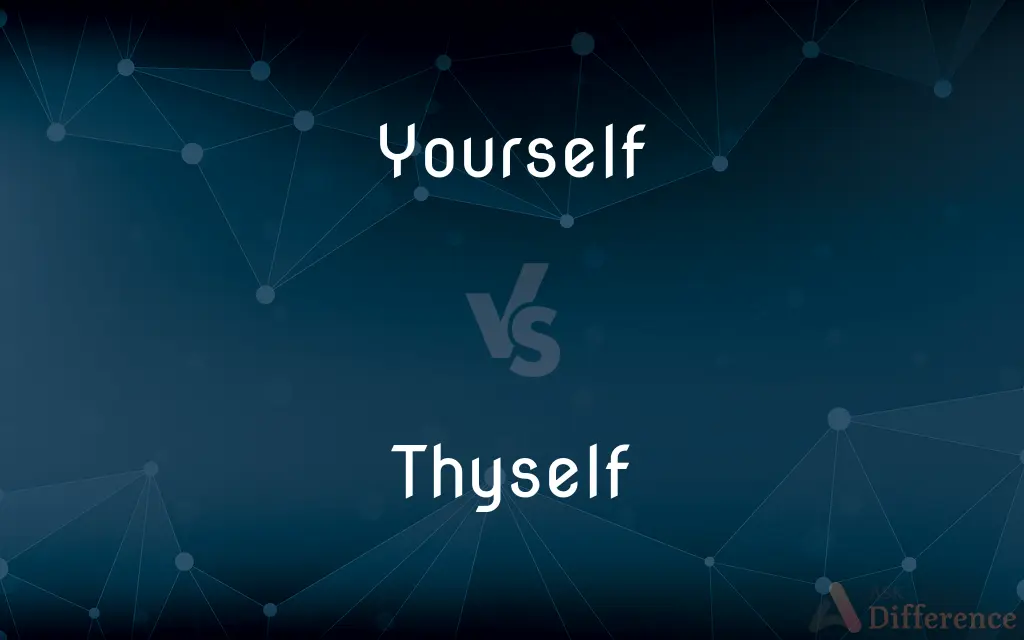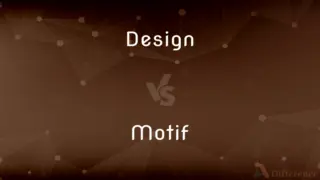Yourself vs. Thyself — What's the Difference?
By Maham Liaqat & Fiza Rafique — Updated on March 17, 2024
Yourself is a reflexive pronoun used in modern English to refer to the person being addressed, while thyself is an archaic or poetic form of 'yourself' used in older English.

Difference Between Yourself and Thyself
Table of Contents
ADVERTISEMENT
Key Differences
Yourself is commonly used in contemporary English, serving as a reflexive or emphatic pronoun that refers back to the subject of the sentence when the subject and the object are the same person. It is utilized for emphasis or to indicate that an action is performed by the person being addressed, without the assistance of others. On the other hand, thyself is an archaic second-person singular reflexive pronoun, equivalent to 'yourself' in today's language.
While "yourself" is part of standard modern English vocabulary, employed in both formal and informal contexts, "thyself" now primarily appears in works that seek to evoke an older or more formal tone, or in contexts deliberately mimicking early English styles for artistic or rhetorical effect.
The use of "yourself" facilitates clarity and directness in modern communication, aligning with contemporary linguistic norms. Conversely, the use of "thyself," although rare in everyday conversation, can imbue speech or writing with a vintage or solemn flavor, often reserved for specific literary or religious purposes.
Both pronouns serve the function of directing action back towards the subject, but their usage marks a distinction in tone, period, and context, reflecting the evolution of the English language from its historical forms to its present-day usage.
Comparison Chart
Pronoun Type
Reflexive/Emphatic
Reflexive/Emphatic (Archaic)
ADVERTISEMENT
Usage
Modern English
Archaic or Poetic English
Context
Formal and Informal
Literary, Religious, Poetic
Function
Refers to the addressee
Refers to the addressee (singular)
Contemporary Use
Common in everyday language
Rare, used for stylistic effect
Compare with Definitions
Yourself
Used to refer to the person being addressed.
You should take care of yourself.
Thyself
Archaic form of 'yourself,' referring to the person being addressed.
Know thyself.
Yourself
Emphasizes the subject's role in the action.
You yourself can make the decision.
Thyself
Used in older literature or religious texts.
Love thy neighbor as thyself.
Yourself
Reflects on personal involvement or responsibility.
Ask yourself why you reacted that way.
Thyself
Reflects personal advice or admonition in historical contexts.
Guard thyself against deceit.
Yourself
Indicates doing something without help.
You need to do it by yourself.
Thyself
Can convey introspection or self-reflection in a solemn or formal tone.
To thine own self be true, and it must follow, as the night the day, thou canst not then be false to any man.
Yourself
Used in instructions or advice.
Check yourself before you leave.
Thyself
Employed for poetic or stylistic effect.
Thou must brace thyself for the journey ahead.
Yourself
Used to refer to the person being addressed as the object of a verb or preposition when they are also the subject of the clause
Help yourselves, boys
See for yourself
Thyself
Yourself as the object of a verb or preposition or as an intensifier; reflexive case of thou
Thou hast only thyself to blame.
Thou thyself art to blame.
Physician, heal thyself.
Yourself
You personally (used to emphasize the person being addressed)
You're going to have to do it yourself
Thyself
An emphasized form of the personal pronoun of the second person; - used as a subject commonly with thou; as, thou thyself shalt go; that is, thou shalt go, and no other. It is sometimes used, especially in the predicate, without thou, and in the nominative as well as in the objective case.
Thyself shalt see the act.
Ere I do thee, thou to thyself wast cruel.
Yourself
(reflexive pronoun) Your own self (singular).
Be careful with that fire or you'll burn yourself.
Yourself
You (singular); used emphatically, especially to indicate exclusiveness of the referent's participation in the predicate, i.e., that no one else is involved.
You yourself know that what you wrote was wrong.
After a good night's sleep you'll feel like yourself again.
Yourself
An emphasized or reflexive form of the pronoun of the second person; - used as a subject commonly with you; as, you yourself shall see it; also, alone in the predicate, either in the nominative or objective case; as, you have injured yourself.
Of which right now ye han yourselve heard.
If yourselves are old, make it your cause.
Why should you be so cruel to yourself ?
The religious movement which you yourself, as well as I, so faithfully followed from first to last.
Common Curiosities
How does using 'thyself' affect the tone of a conversation or text?
Using 'thyself' can impart a text or speech with a solemn, formal, or historical ambiance, contrasting with the straightforward and modern connotation of 'yourself.'
Are there modern contexts where 'thyself' might still be used?
'Thyself' might appear in modern contexts that deliberately emulate archaic language for artistic, rhetorical, or thematic reasons, such as in poetry, religious discourse, or works evoking historical periods.
Why is 'thyself' rarely used today?
'Thyself' is considered archaic and has been largely replaced by 'yourself' in modern English, except in literary, poetic, or religious contexts that aim to evoke a historical or formal tone.
Is 'thyself' singular or plural?
'Thyself' is singular, addressing a single individual in the second person, equivalent to the modern singular 'yourself.'
How do I know when to use 'yourself' or 'thyself'?
Use 'yourself' in standard communication and modern writing. 'Thyself' is appropriate for artistic, literary, or historical contexts where an archaic tone is desired.
Can 'thyself' be used in formal writing?
'Thyself' can be used in formal writing if it aims to reflect historical accuracy, literary style, or specific rhetorical effects, but 'yourself' is preferred for contemporary formal writing.
Is it grammatically correct to use 'thyself' in modern English?
While grammatically correct, 'thyself' is archaic and its use in modern English is largely stylistic or thematic, rather than standard.
Can 'thyself' be found in modern translations of historical texts?
Modern translations might replace 'thyself' with 'yourself' for clarity and accessibility, though some may retain it to preserve the original's stylistic nuances.
How has the transition from 'thyself' to 'yourself' influenced English language teaching?
The transition reflects the evolution of the language, with teaching focusing on 'yourself' for practical, contemporary communication, while 'thyself' is taught within specific literary or historical studies.
Can 'thyself' and 'yourself' be used interchangeably?
While they technically serve the same grammatical function, their usage depends on the tone and context, with 'thyself' fitting into more archaic or stylized settings and 'yourself' used in contemporary language.
Are there dialects or regions where 'thyself' is still used?
'Thyself' is not commonly used in any specific dialects or regions in modern times, except possibly within certain religious communities or in historical reenactment contexts.
Does the use of 'thyself' change the meaning of a sentence?
The use of 'thyself' does not change the fundamental meaning but alters the tone and stylistic period of the sentence, signaling an archaic or poetic flavor.
How do 'yourself' and 'thyself' relate to the development of the English language?
Their usage illustrates the shift from Middle English to Modern English, highlighting changes in grammar, vocabulary, and stylistic preferences over time.
How does the choice between 'yourself' and 'thyself' reflect on the speaker or writer?
The choice reflects the speaker's or writer's intent to convey a message in a contemporary versus an archaic or stylized manner, impacting the perceived tone and formality.
Share Your Discovery

Previous Comparison
Design vs. Motif
Next Comparison
Winery vs. VineyardAuthor Spotlight
Written by
Maham LiaqatCo-written by
Fiza RafiqueFiza Rafique is a skilled content writer at AskDifference.com, where she meticulously refines and enhances written pieces. Drawing from her vast editorial expertise, Fiza ensures clarity, accuracy, and precision in every article. Passionate about language, she continually seeks to elevate the quality of content for readers worldwide.











































